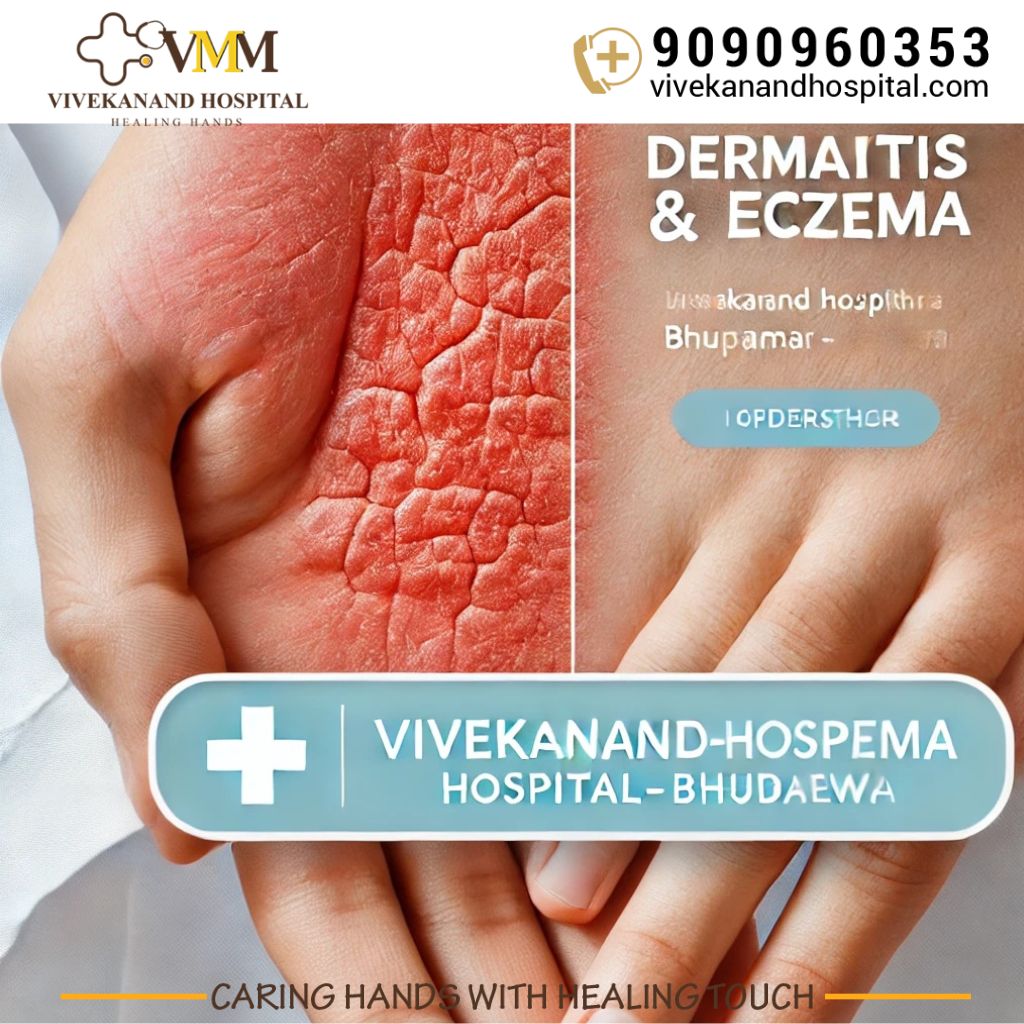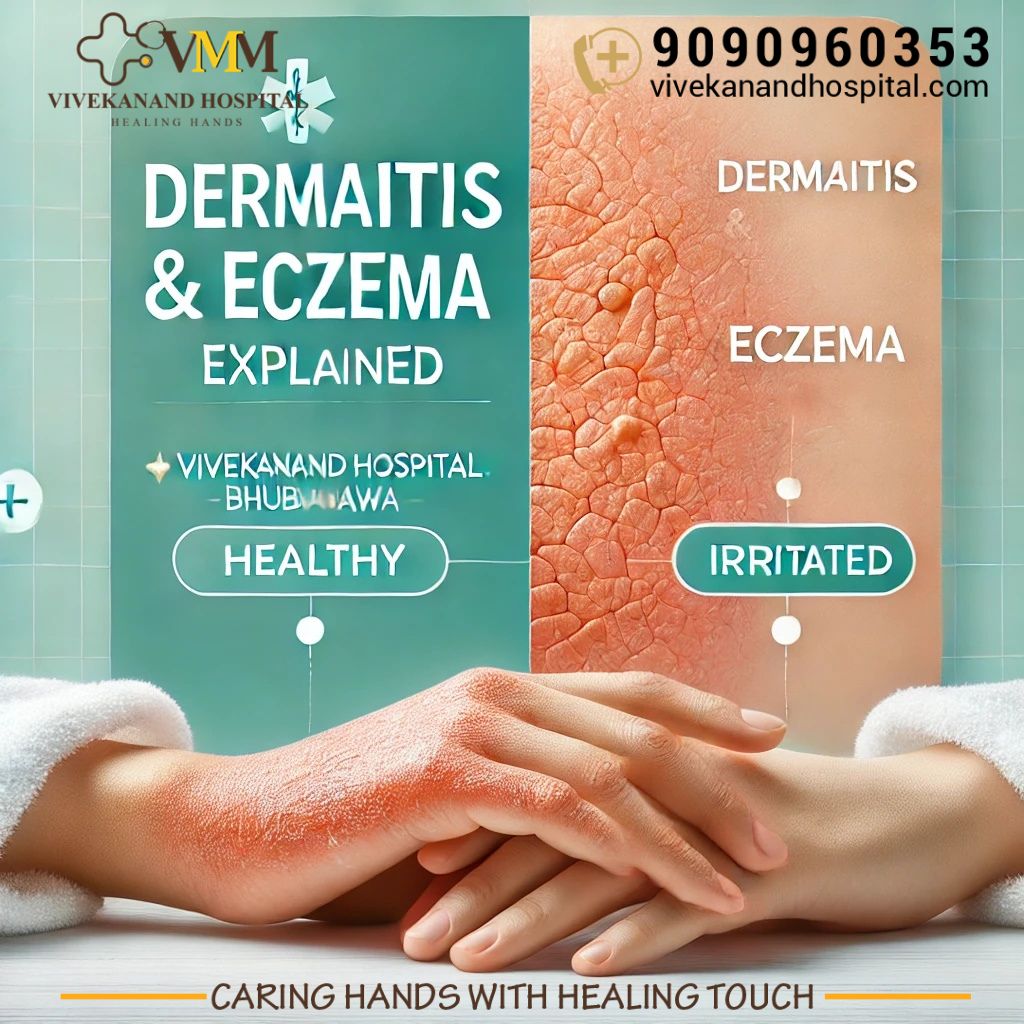Introduction:
Dermatitis and eczema are terms often used interchangeably to describe a group of skin conditions characterized by inflammation, redness, and itching. These conditions can affect individuals of all ages and can significantly impact the quality of life. At Vivekanand Hospital-Bhubaneswar, we are committed to providing comprehensive care and information to help you manage and treat these skin concerns effectively.
What Are Dermatitis and Eczema?
Understanding the Terms:
Dermatitis refers to inflammation of the skin, resulting in symptoms like redness, swelling, and itching. Eczema is a broader term that encompasses various inflammatory skin conditions, with atopic dermatitis being the most common form. While all dermatitis is eczema, not all eczema is dermatitis; the distinction lies in the specific causes and manifestations of each condition.
Types of Eczema:
– Atopic Dermatitis: A chronic condition often starting in childhood, associated with a family history of allergies.
– Contact Dermatitis: Occurs when the skin reacts to direct contact with irritants or allergens.
– Seborrheic Dermatitis: Characterized by oily, scaly patches, commonly affecting the scalp.
– Nummular Eczema: Presents as circular, itchy spots on the skin.
READ ALSO: Kidney Stone Treatment in Bhubaneswar at Vivekanand Hospital
Causes and Risk Factors:
Genetic Factors:
A family history of eczema, asthma, or hay fever increases the likelihood of developing atopic dermatitis. Mutations in the gene responsible for filaggrin, a protein that helps maintain the skin’s barrier function, have been linked to eczema.

Environmental Triggers:
Exposure to allergens (such as pollen, dust mites, and pet dander), irritants (like soaps and detergents), and changes in weather can trigger or exacerbate symptoms.
Lifestyle Factors:
Stress, sweating, and wearing rough or tight clothing can worsen eczema symptoms. Maintaining a regular skincare routine and avoiding known triggers are essential for managing the condition.
Symptoms:
– Itching: Often severe and persistent, leading to scratching and further skin damage.
– Redness and Inflammation: Affected areas may appear red or darker than the surrounding skin.
– Dry, Scaly Skin: The skin may become dry, cracked, and prone to infections.
– Thickened Skin: Chronic scratching can lead to lichenification, where the skin becomes thick and leathery.
Diagnosis:
Diagnosis primarily involves a thorough medical history and physical examination. In some cases, patch testing or skin biopsies may be conducted to identify specific allergens or rule out other conditions.
Treatment Options:
Topical Treatments:
– Corticosteroids: Reduce inflammation and itching.
– Calcineurin Inhibitors: Non-steroidal medications that modulate the immune response.
– Moisturizers: Regular use helps restore the skin barrier and prevent dryness.
Systemic Treatments:
– Oral Medications: Antihistamines to control itching or immunosuppressants for severe cases.
– Biologic Therapies: Target specific components of the immune system to reduce inflammation.
Phototherapy:
Exposure to controlled ultraviolet light can help reduce symptoms in moderate to severe cases.
Prevention and Management:
– Identify and Avoid Triggers: Keep a diary to track flare-ups and potential triggers.
– Skincare Routine: Use gentle, fragrance-free products and moisturize regularly.
– Lifestyle Modifications: Manage stress through relaxation techniques and ensure a balanced diet
Conclusion:
Understanding dermatitis and eczema is the first step toward effective management. At Vivekanand Hospital-Bhubaneswar, our dermatology specialists are dedicated to providing personalized care tailored to your specific needs. If you or a loved one is experiencing symptoms of eczema or dermatitis, we encourage you to consult with our healthcare professionals for comprehensive evaluation and treatment.

